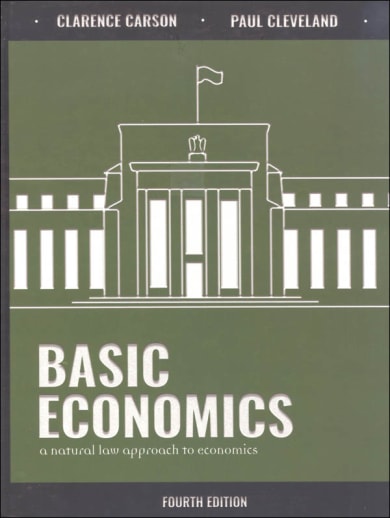This is probably the most serious economics course that we offer. It was written by Clarence B. Carson, known for his books on history and government. Carson wrote from a conservative Christian viewpoint, with the goal of distilling ideas down to fundamental principles. Dr. Carson was a mentor of Dr. Paul Cleveland, a professor of economics, who revised and updated the book to this fourth edition.
The focus of the book is economics, but because of Carson's knowledge of history and government, the economic principles are often explained with historical examples. The book is written in a serious but readable style, with examples to illustrate the principles. The book begins with a high-level overview of man's nature, government, the Judeo-Christian foundation of the free market, and property. From this foundation, Section II gets into common topics of economics: scarcity, money, market and prices, competition and monopoly, production, the entrepreneur, distribution of wealth, and international trade. Section III blends economic principles with government history, starting with the feudal system, then to mercantilism, free enterprise, corporatism, welfarism (socialism), and communism.
Chapters average 17 pages in length, usually divided into 4 or 5 topics. Following each chapter is a two-page Study Guide to ensure a grasp of the main points. This includes a chapter summary, several "Points of Emphasis," which distill the whole chapter into a few bullet points, several review questions, a vocabulary list of 20-30 terms and activities and/or suggestions for further study. A glossary and index can be found at the end of the book.
This is a meaty course, not the "milk" of a lightweight introduction to economics, and is intended for a serious student. 378 pgs, hc. ~ Bob

